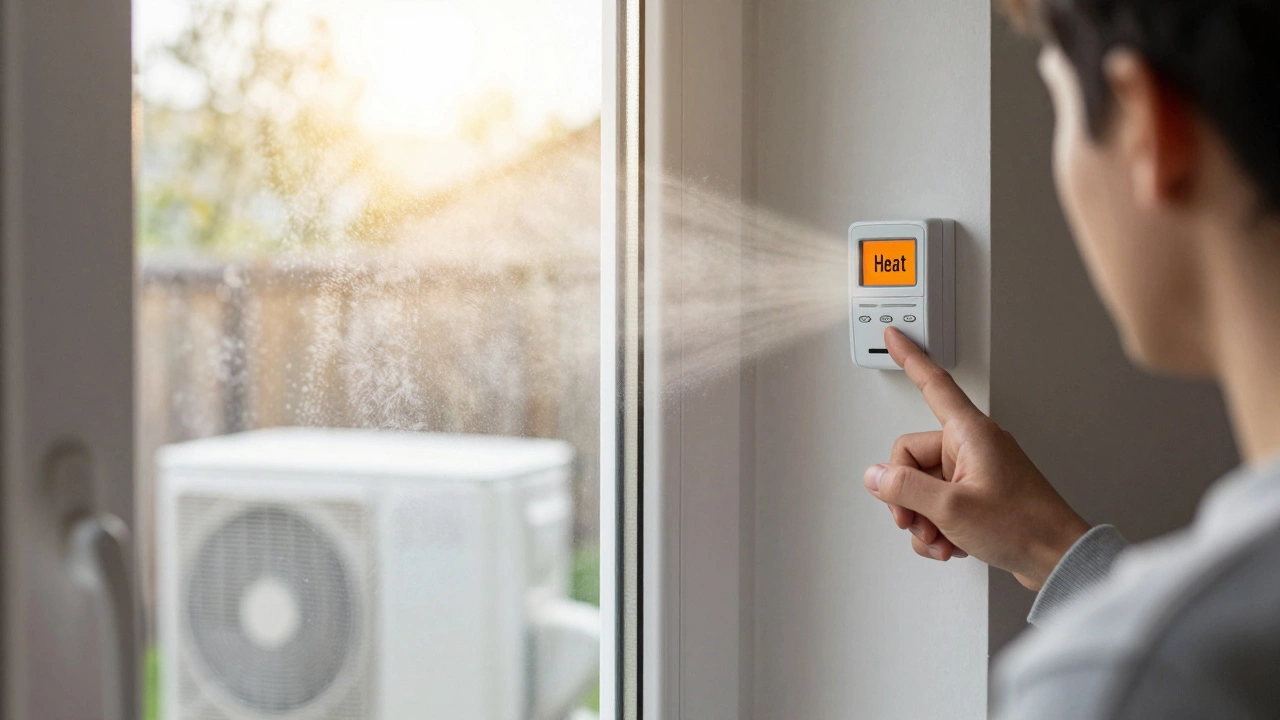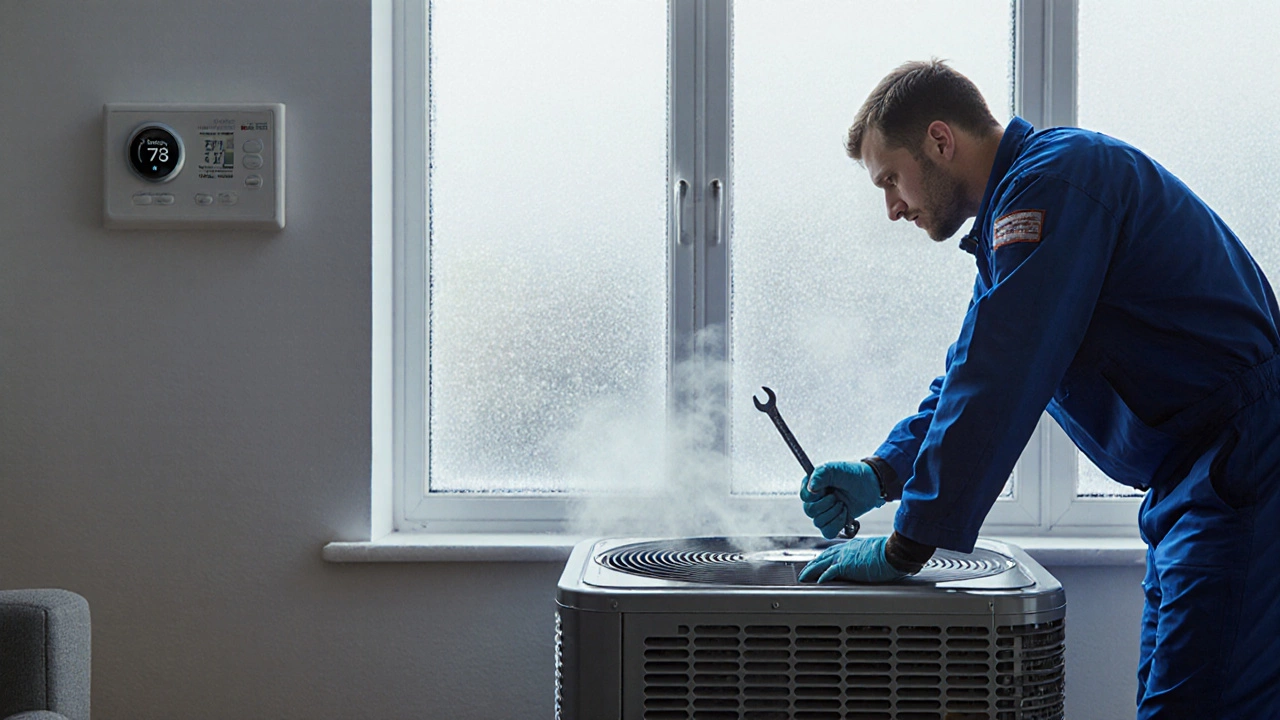
- 27 Jul 2025
- Gideon Thornton
- 0
Imagine shelling out a pile of cash for a heat pump, then sitting by your window on a chilly night when it conks out again. Too many people forget heating and cooling gear isn’t about logos or flashy marketing—it’s about keeping you warm, cool, and worry-free for years. Reliability is where things get real, and the truth is, not every "top brand" deserves the trust it gets.
What Reliability Really Means for Heat Pumps
Reliability in the heat pump world isn’t just about a machine running every day without fail. It boils down to a few hard facts: how long a unit keeps your house comfortable before something major breaks, how often you have to call a repair tech, and if you can get affordable parts when things go sideways. In 2024, Consumer Reports’ annual reliability survey showed that around 28% of homeowners experienced a heat pump breakdown in the first eight years. That’s not nothing. Reliability rankings aren’t just manufacturer bragging rights—they could impact your wallet, stress level, and comfort for a decade or more.
A reliable pump keeps doing its job with just basic filter swaps and the odd tune-up. Unreliable models lose efficiency, break down, and make you wait for expensive repairs—often right in the middle of a heatwave or a cold snap. So when folks ask what brand is "the best," they’re really asking about odds: What brand am I least likely to regret?
Here’s another boundary: reliability is part manufacture, part installer skill, and part how you treat the thing. Even the sturdiest brand can let you down if it’s shoddily installed or ignored after the warranty card is mailed. That’s why surveys often show that users with the same brand can have polar-opposite experiences, depending on how the system was installed, sized, and maintained. The best brands reliably perform across many different homes, climates, and contractors.
Brands With a Reputation for Reliability in 2025
If you talk to seasoned HVAC technicians or comb through thousands of verified reviews, a handful of heat pump brands float to the top year after year. In 2025, the familiar big names—Trane, Mitsubishi, Carrier, and Lennox—are still fighting at the top, but some newer players are shaking things up too.
Trane has built its entire image around reliability. Their systems tend to last longer than most, according to surveys by Consumer Reports and independent repair networks. Many homeowners buy Trane expecting their unit to just "work" for 10-15 years, aside from some filter changes. Their compressors and coils tend to hold up in both heat and cold, and their warranty claims among owners have remained consistently low for nearly a decade now.
Mitsubishi’s reputation is forged on whisper-quiet ductless mini splits and beefy outdoor units that run even in frigid climates. For anyone who cares about reliability, Mitsubishi’s track record in parts of Canada and the northern U.S. is hard to swipe past. Their advanced inverter technology keeps strain low, meaning fewer burnout repairs over time. Customer satisfaction across 2023 and 2024 showed over 80% of survey respondents with Mitsubishi mini splits reported zero breakdowns in the last five years.
Carrier heat pumps are steady favorites, especially in new construction and retrofits. Their Infinity and Performance models are workhorses, usually giving between 12-17 years before needing a major part replaced. The 2024 Reader’s Digest Trusted Brands survey put Carrier near the top for long-term homeowner satisfaction, thanks largely to easy-to-source parts and responsive local support.
Lennox sometimes catches flak for premium pricing, but their Elite and Signature series heat pumps are known for quietly plugging away with few big problems—provided you keep up with the basic annual tune-ups. When Lennox units fail, it’s usually after 12 years or so, a lifespan that’s above the industry average.
Don’t sleep on Daikin, either. Japanese engineering and a strong dealer network have made these heat pumps serious contenders over the past few years. Their Smart Inverter models are built to adapt to sudden weather changes—a clutch feature if you live somewhere with wild temperature swings.
Other names—Rheem, York, American Standard—can run well, but their reliability scores across North America are more . . . unpredictable. Local dealer quality is huge with these brands, so one town might have fantastic results, while the next city over sees endless recalls.

What Actually Affects Heat Pump Reliability?
Don’t fall for factory hype. Not every “high-efficiency” machine is built the same. Let’s break down what really matters when talking reliability:
- Compressor Quality: This is the heart of your heat pump. Brands like Trane and Mitsubishi use proprietary compressors with proven track records. Lesser-known brands tend to buy third-party parts, so if that part line drops in quality, so does your unit’s lifespan.
- Control Boards: The computer in every modern heat pump is notorious for being a weak link, especially in cheaper models. The most reliable brands design these systems with better waterproofing and surge protection.
- Installer Skill: A flawless machine installed wrong will perform worse than a "meh" brand that's set up perfectly. Every big reliability study from 2020-2024 has proven install quality matters just as much as the brand logo.
- Climate Compatibility: Some heat pumps are made for mild winters, others are monsters in -15°C. If a brand isn’t tested for your region, don’t expect miracles when the weather goes wild.
- Parts Availability: Older or rare brands—maybe a bargain at first—can leave you waiting weeks for simple fixes. Brands with widespread dealer networks win points here.
- User Behavior: Neglect kills even the best machines. Not cleaning filters, letting coils clog, or ignoring weird noises all chip away at reliability fast.
One wild fact: According to a 2024 field survey of over 1,700 systems by the North American Technician Excellence (NATE), 42% of "no heat" calls were linked to dirty filters or lack of basic tune-ups, not true heat pump failures. So how you treat your gear really does matter.
How Warranties and Service Network Play a Role
Warranties are like insurance: you hope you never need them, but when you do, the fine print matters. Most leading brands push out 10-year parts warranties, but only transfer them if a licensed installer sets everything up. Trane, Lennox, and Mitsubishi win points for hassle-free warranty claims and actually standing by their coverage—even when things get tricky.
Where folks run into trouble: some discount brands (especially from online-only retailers or overseas) offer “lifetime” warranties, but with so many exclusions and hoops that repairs are nearly impossible without out-of-pocket costs. Always ask your installer: Who handles the paperwork? Who pays the labor? And if a compressor dies at year nine, will the company ship a replacement or blame maintenance?
Another biggie is the brand’s local dealer network. Even the best gear is useless if nobody nearby is certified to fix it. Brands like Mitsubishi and Trane only allow warranty work by authorized dealers who’ve gone through regular training. If you live in the middle of nowhere, stick with brands that have real support within 50 miles of your home. Nothing’s worse than a busted machine in January, waiting three weeks for a part to ship from across the country.
A quick tip: always register your new heat pump, online or with a paper card, right after install. Some brands cut the warranty in half if you forget.

Tips for Picking a Reliable Heat Pump for Your Home
Sticker shock is real—the best units cost thousands. But cutting corners is more expensive in the long run. Here’s how to stack the odds in your favor when hunting for the best heat pump brand:
- Ask Local Pros: Repair techs know what fails and what runs forever in your climate. Their stories beat any online ad.
- Check for Certifications: Look for NATE-certified installers and dealer approval from the brand. It’s worth paying extra for someone who won’t void your warranty on day one.
- Research the Service Network: Before buying, search the brand’s dealer locator. If nobody comes up within driving distance, think twice.
- Consider Your Climate: If you live up north, don’t settle for a "mild zone" model. Look for units backed by field tests in low temperatures—ask for real-world stories, not just spec sheet promises.
- Dive Into Owner Reviews: Look for comments about long-term satisfaction, not just day-one impressions. Amazon, Home Depot, Reddit—sometimes brutally honest, sometimes a mess, but together they paint a real picture.
- Read the Fine Print: Ask about the warranty, what parts are covered, and who pays for labor. The devil really is in the details.
- Keep Up on Maintenance: Set reminders to change filters and book tune-ups before the season’s peak. It’s boring, but it’s insurance for your investment.
- Don’t Be Seduced by Extras: Fancy WiFi controls are cool but don’t mean a thing if the guts aren’t solid. Pick substance before smart features.
Heat pump tech is changing fast. Don’t just chase this year’s hot brand—chase the one that makes you forget it’s even there, year after year.



